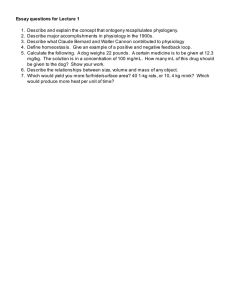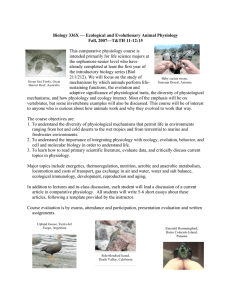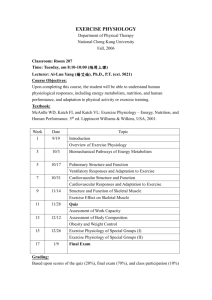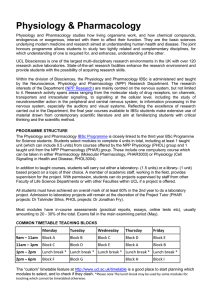Physiology
advertisement
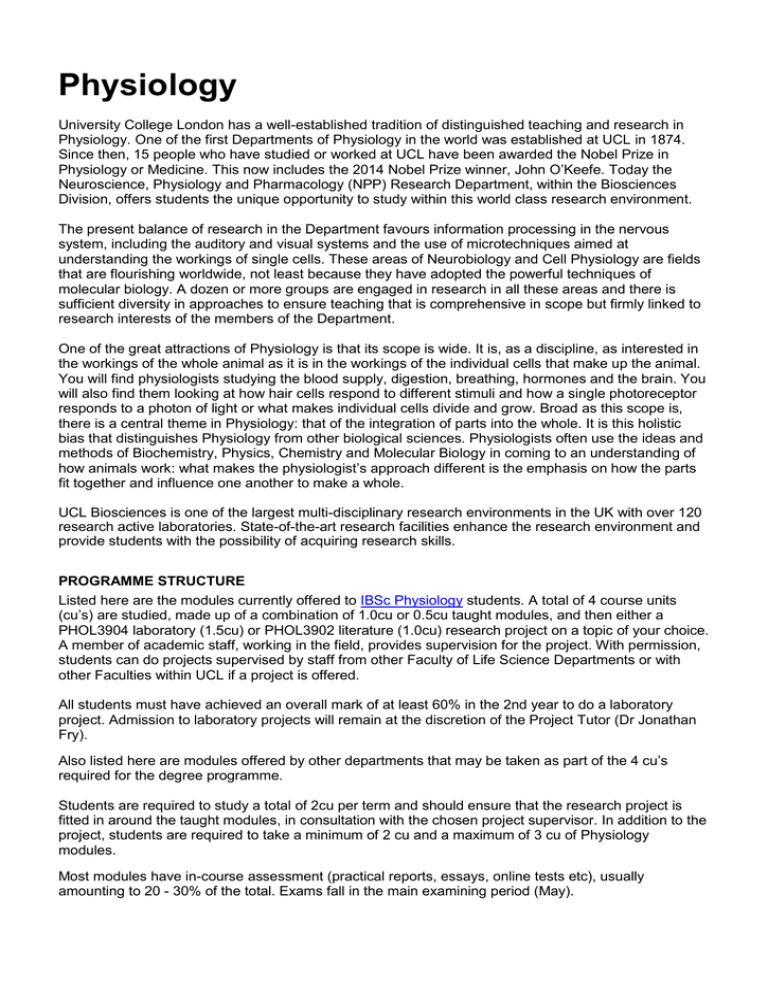
Physiology University College London has a well-established tradition of distinguished teaching and research in Physiology. One of the first Departments of Physiology in the world was established at UCL in 1874. Since then, 15 people who have studied or worked at UCL have been awarded the Nobel Prize in Physiology or Medicine. This now includes the 2014 Nobel Prize winner, John O’Keefe. Today the Neuroscience, Physiology and Pharmacology (NPP) Research Department, within the Biosciences Division, offers students the unique opportunity to study within this world class research environment. The present balance of research in the Department favours information processing in the nervous system, including the auditory and visual systems and the use of microtechniques aimed at understanding the workings of single cells. These areas of Neurobiology and Cell Physiology are fields that are flourishing worldwide, not least because they have adopted the powerful techniques of molecular biology. A dozen or more groups are engaged in research in all these areas and there is sufficient diversity in approaches to ensure teaching that is comprehensive in scope but firmly linked to research interests of the members of the Department. One of the great attractions of Physiology is that its scope is wide. It is, as a discipline, as interested in the workings of the whole animal as it is in the workings of the individual cells that make up the animal. You will find physiologists studying the blood supply, digestion, breathing, hormones and the brain. You will also find them looking at how hair cells respond to different stimuli and how a single photoreceptor responds to a photon of light or what makes individual cells divide and grow. Broad as this scope is, there is a central theme in Physiology: that of the integration of parts into the whole. It is this holistic bias that distinguishes Physiology from other biological sciences. Physiologists often use the ideas and methods of Biochemistry, Physics, Chemistry and Molecular Biology in coming to an understanding of how animals work: what makes the physiologist’s approach different is the emphasis on how the parts fit together and influence one another to make a whole. UCL Biosciences is one of the largest multi-disciplinary research environments in the UK with over 120 research active laboratories. State-of-the-art research facilities enhance the research environment and provide students with the possibility of acquiring research skills. PROGRAMME STRUCTURE Listed here are the modules currently offered to IBSc Physiology students. A total of 4 course units (cu’s) are studied, made up of a combination of 1.0cu or 0.5cu taught modules, and then either a PHOL3904 laboratory (1.5cu) or PHOL3902 literature (1.0cu) research project on a topic of your choice. A member of academic staff, working in the field, provides supervision for the project. With permission, students can do projects supervised by staff from other Faculty of Life Science Departments or with other Faculties within UCL if a project is offered. All students must have achieved an overall mark of at least 60% in the 2nd year to do a laboratory project. Admission to laboratory projects will remain at the discretion of the Project Tutor (Dr Jonathan Fry). Also listed here are modules offered by other departments that may be taken as part of the 4 cu’s required for the degree programme. Students are required to study a total of 2cu per term and should ensure that the research project is fitted in around the taught modules, in consultation with the chosen project supervisor. In addition to the project, students are required to take a minimum of 2 cu and a maximum of 3 cu of Physiology modules. Most modules have in-course assessment (practical reports, essays, online tests etc), usually amounting to 20 - 30% of the total. Exams fall in the main examining period (May). COMMON TIMETABLE TEACHING BLOCKS Monday Tuesday Wednesday Thursday Friday 9am – 11am Block A Block B Block C Block D Block E 11am – 1pm Block C Block D Block E Block A Block B 1pm – 2pm Lunch break * Lunch break * Lunch break * Lunch break * Lunch break * 2pm – 6pm Block F Block G Block H Block I *The lunch break may be used by some modules for teaching which cannot be timetabled otherwise. The “custom” timetable feature at http://www.ucl.ac.uk/timetable is a good place to start planning which modules to select, and to check if they clash. COURSES CURRENTLY AVAILABLE FOR IBSc PHYSIOLOGY STUDENTS As long as the rules previously detailed are adhered to, students can also choose modules offered by other Departments (timetable, capacity and tutors permitting). The FLS Module Database (https://www.ucl.ac.uk/lifesciences-faculty-php/courses/search.php) stores updated information on all modules run in the Faculty of Life Sciences, and you should consult this database when making your module choices. Please note: Some modules in the Faculty of Life Sciences are heavily subscribed, and are therefore capped. The FLS Module Database entry indicates, for each module, whether it is capped, and if it is, the selection criteria applied. Modules which accept a restricted number of students are indicated in the listings below. AIMS We aim to: Recruit high calibre students. Stimulate the student’s interest in the subject. Inform the students of the basic facts on which their knowledge can be built. Promote the capacity for self-education. Develop the ability to evaluate critically both theories and evidence. Provide teaching that is informed by research. Produce graduates well equipped for advanced study, research. Provide the opportunity for in-depth study in a defined area of medical science. OBJECTIVES Graduates of Physiology will have acquired the skills to: Compile and critically evaluate information (study skills). Use a range of common laboratory techniques competently and safely, as part of a team or individually. Plan, carry out and compile a detailed report on a piece of original research that they have personally conducted (specific subject knowledge, research skills, report writing). Demonstrate the development of skills necessary to work both as individuals and as part of a team, e.g. time management, decision making, sharing of resources, co-operation with others, autonomous learning. Have detailed knowledge of the specialist areas they have chosen. PHOL3001: Respiration in Health and Disease 0.5 unit Module organiser: Prof Alex Gourine and Dr Gareth Ackland Term 2 Blocks A & G This module examines the control of breathing particularly in humans, in a wide range of physiological and pathophysiological conditions including exercise, altitude, sleep and asthma. The relationship between respiratory function, structural anatomy and pathological states are explored. Module assessment: Oral Presentation (10 minutes) 20%; Summary of Oral Presentation (One page) 5%; Unseen two-hour written examination 75%. PHOL3002: The Heart and Circulation 1 unit Module organiser: Prof Lucie Clapp Term 1 Blocks A & H The module builds upon your primary knowledge of the heart and circulation. Essential aspects of cardiac and vascular physiology will be considered. This will enable you to grasp a number of areas of experimental, applied and patho- physiology. Module assessment: Blood Pressure Prac 2.00%, Organ Bath Pharmacology Prac 3.00%, Poster preparation plus 15 minute presentation 15.00%, Unseen three-hour written examination 65.00%, Essay (2,750 words) 15.00% Restrictions: only a limited number of students can be accepted. Please check FLS Module Database. PHOL3004: Cell Signalling in Health and Disease 1 unit Module organiser: Dr Julie Pitcher Term 1 Blocks C & G and Term 2 Blocks D & I All cell processes are regulated by signalling pathways. The correct regulation of cell processes is critical for the development and homeostasis of animals whereas dysregulation of these processes results in diseases as diverse as diabetes, schizophrenia and cancer. Taking advantage of the outstanding research environment at UCL, this module will consist of a series of lectures and associated journal clubs presented by research scientists of international renown. The lecturers will discuss the signalling pathways that regulate distinct cell processes such as such as proliferation, cell:cell communication, motility, differentiation, fertilisation and cell death. Each researcher will focus on their own research strengths to present an overview of the field, followed by a presentation of work from their own laboratory. The associated journal club will discuss a recent innovative piece of work related to the research area. Module assessment: Two essays 15 %; One orally assessed coursework 7.5%; One written coursework/problem paper 7.5%; Unseen three-hour written examination 70%. Restrictions: only a limited number of students can be accepted. Please check FLS Module Database. PHOL3006: Cellular Basis of Brain Function 1 unit Module organisers: Prof Angus Silver, Prof Jonathan Ashmore & Dr Beverley Clark Term 1 Blocks A & H The course covers the description of brain function from Molecule, to Cell and to System levels. The detailed topics include: 1) Methods, ion channels, channelopathies, transporters and ischaemia; 2) Synaptic transmission, plasticity, integration and dendrites; 3) Metabolism, microcircuits, coding, sensory processing, neural networks and the control of behaviour. This structure is designed to provide a thorough grounding in the cellular mechanisms of brain function in health and disease. Module assessment: Two essays 16%; Unseen three-hour written examination 75%; Two practical write ups 9%. PHOL3009: Space Medicine and the Extreme Environment Physiology 1 unit Module organisers: Dr Kevin Fong and Dr Daniel S Martin Term 1 Block C & G The Module aims to: 1) To provide an understanding of the physiological effects of the space environment upon the human body and the biomedical problems associated with long and short duration manned space flight. 2) To explore the physiological effects of ascent to high altitude and understand the pathophysiology of altitude induced illnesses. 3) To understand the effects of the hyperbaric environment experienced underwater and the benefits of hyperbaric oxygen administer in a chamber. 4) To discuss the issues faced when travelling to areas of extreme temperature and how the body adapts to them. Module assessment: Unseen written examination 80.00%, One essay (2,000 words) 10.00%, One seminar presentation (10 minutes) 10.00% Restrictions: only a limited number of students can be accepted. Please check FLS Module Database. PHOL3011: Autonomic and Central Control of Cardiorespiratory Function 0.5 units Module organiser: Dr Ian Edwards Term 2 Block B & H This module will look at the autonomic control of the cardiovascular and respiratory systems. The module will cover the anatomy of the autonomic nervous system (introducing the relevant peripheral and central areas that are involved in homeostatic control), the sympathetic nervous system and the parasympathetic nervous system (specifically how they interact to control the activity of the cardiovascular system), the central respiratory network and how it establishes normal breathing patterns, and finally how the activity in these pathways changes in response to exercise and disease. This will be accompanied by a mini-project comparing the sympathetic/parasympathetic balance in different exercise paradigms. Module assessment: Project report (2,000 words) 20.00%, Laboratory worksheets 10.00%, Unseen three-hour written examination 70.00%. Restrictions: only a limited number of students can be accepted. Please check FLS Module Database. PHOL3016: Cell Polarity and Disease 1 unit Module organisers: Prof. Shamshad Cockcroft and Dr Anselm Zdebik Term 1 Block E & I Epithelial cells form sheets that cover the surface of the body and line the internal organs and perform vectorial functions. The module aims to provide an understanding of epithelia tissues by describing: how the polarization of epithelia is maintained; the mechanisms underlying the regulated directional transport of ions, nutrients and water across epithelia; normal physiological function of the renal, gastrointestinal and respiratory systems. Module assessment: Unseen three-hour written examination 70%; Seminar presentation 10%; two Inclass invigilated essays 10 %; Invigilated Paper Review 10%. PHOL3902: RESEARCH PROJECT IN PHYSIOLOGY (LITERATURE) 1.0 unit Module organiser: Dr Jonathan Fry Term 1 or 2 Blocks - Any Assessment: One report 70%. One poster presentation 30% This is literature based project that allows students to conduct some physiological research, utilising library resources, on a subject/topic offered by a member of staff in the Department of Physiology or associated departments. A poster presentation is an integral part of the marking scheme. PHOL3904 RESEARCH PROJECT IN PHYSIOLOGY (LABORATORY) 1.5 units Module organiser: Dr Jonathan Fry Term 1 or 2 Blocks - Any Assessment: Laboratory performance 15%, Report 70%, One poster presentation 15% This is research-based project that allows students to conduct some original physiological research in the laboratory of a member of academic staff. The aim of the module is to introduce students to contemporary research methods in a specific area of physiology, to develop the ability to evaluate critically both theories and evidence and to produce graduates well equipped for advanced study. Students have 9 weeks in which to complete their projects; this includes the period for analysing data and writing up. Pre-requisites: Students will be required to obtain an average of at least 60% in their second year exams. Popular modules provided by other departments and taken by intercalating physiology students: NEUR3001: Advanced Visual Neuroscience 1 unit Module organiser: Professor Andrew Stockman Term 2 Block D & G The aim of this module is to provide students with an understanding of the functional anatomy and neurophysiology of the visual system, and an understanding of how neural activity results in visual perception and in behaviours that depend on vision. Students will be introduced to a variety of methods for investigating visual neuroscience including molecular biology, psychophysics, single cell recording, electrophysiology, brain imaging, and the experimental study of patients with brain damage or genetic defects. Module assessment: Seminar presentation 10.00%, Log book 10.00%, One essay (2,000-2,5000 words) 20.00%, Unseen three-hour written examination 60.00% NEUR3003: Metabolic Neuroscience 0.5 units Module organiser: Dr Stefan Trapp Term 2 Block E The lectures in this module cover metabolic neuroscience research at an advanced level. They provide a thorough understanding of the physiology of metabolic regulation based on current ongoing research in this area. The lectures cover metabolic disease and discuss current and novel treatment strategies. Finally, emphasis is placed on the key technical approaches applied in metabolic neuroscience and their critical evaluation, as addressed in the journal club. The in-course assessment and associated guidance is aimed at honing both verbal and written presentation skills within the subject area. The content of the course is delivered through 22 lectures given by research-active experts in the respective areas. This will be supplemented by a series of Journal clubs and Seminars where each student will be taking the lead in turn. These presentations will form part of the in course assessment together with the preparation of a 'News and Views' style review article selected from a variety of topics. Module assessment: Review article (2,000 words) 15.00%., Unseen three-hour written examination 70.00%., Oral presentation 15.00%. Restrictions: only a limited number of students can be accepted. Please check FLS Module Database. NEUR3031: Control of Movement 0.5 unit Module organiser: Prof Christopher Yeo Term 2 Block A The module begins by considering the anatomy and physiology of essential components of the motor system; muscles and the motor unit; proprioception; spinal integration; ascending and descending pathways in the spinal cord; motor cortex; basal ganglia and cerebellum. The integrated action of these systems in locomotion, voluntary movements and eye movements is considered. The module includes tutorials with target papers through the course and concludes with analyses of motor learning and modelling of motor control. Module assessment: Unseen three-hour written examination 100% NEUR3045: Visual Neuroscience 0.5 unit Module organiser: Prof Andrew Stockman Term 2 Block G This module will teach visual neuroscience from a broad, interdisciplinary point of view. Our modern understanding of vision and visual processing depends not only on the more traditional fields of anatomy, physiology and psychophysics, which remain centrally important, but also on the fields of genetics, molecular and cellular biology, ophthalmology, neurology, cognitive neuroscience and brain imaging. In this module, we will present visual neuroscience as a multidisciplinary, yet integrated field of study. This half unit also makes up part of the full unit module NEUR3001 “Advanced Visual Neuroscience”. Module assessment: Unseen two-hour written examination 80%; Oral presentation 20%. ANAT3042: Pain 0.5 unit Module organiser: Prof Steve Hunt Term 2 Block D This module aims to present an integrated approach to pain. Through a series of 18 lectures, students will be presented with information about the basic mechanisms of pain and its clinical manifestations. Students will also be introduced to current ideas about therapy and management and to the problems inherent in measurements of pain. A series of seminars based on reading topics will be held at the end of the module. Module assessment: Unseen three-hour written examination 80 %; 1 Essay 20%. Restrictions: only a limited number of students can be accepted. Please check FLS Module Database CELL3001: Stem Cells and Regenerative Medicine 0.5 unit Module organiser: Professor Tim Arnett Term 2, Block A The aim of the module is to provide an up-to-date survey of the rapidly changing field of stem cell research, from fundamental principles to the practicalities of regenerative medicine. Realistic assessments of progress to date and future potential will be made. Students will acquire a detailed understanding of our current knowledge of stem cell biology and its potential uses in regenerative medicine. Module assessment: One essay (1,200 words) 20.00%, Unseen two-hour written examination 80.00% CELL3050: Advanced Molecular Cell Biology 0.5 unit Module organisers: Dr Jonathan Chubb & Dr Geraint Thomas Term 1 Blocks E and F Introduction to concepts and problems in selected topics of current cell biology Understanding the methods by which data are obtained and their limitations To study original scientific literature relevant to cell function To develop skills to judge the quality and validity of literature. Module assessment: Unseen three-hour written examination 75%; Essay (1,500 words) 12.5%; Paper presentation (15 minutes) 12.5%. The module details listed here may be subject to change. Please contact the Module Organiser for confirmation and further details. FOR FURTHER INFORMATION PLEASE CONTACT Physiology Programme Tutor Dr Ian Edwards Email: i.edwards@ucl.ac.uk Physiology Teaching Administrator Anushka Magan Room G10, Biosciences Teaching Office, Medawar Building Tel: 020 3108 1034 Email: a.magan@ucl.ac.uk Head of Teaching, NPP (Neuroscience, Physiology and Pharmacology) : Dr Talvinder Sihra Tel : 020 7679 3296, Email : t.sihra@ucl.ac.uk Alternatively consult our website at: https://www.ucl.ac.uk/biosciences/degree-programmes/prospectivestudents/physiology_ibsc For Further information about Biosciences Modules and Teaching: https://www.ucl.ac.uk/biosciences/degree-programmes/modules-teaching
